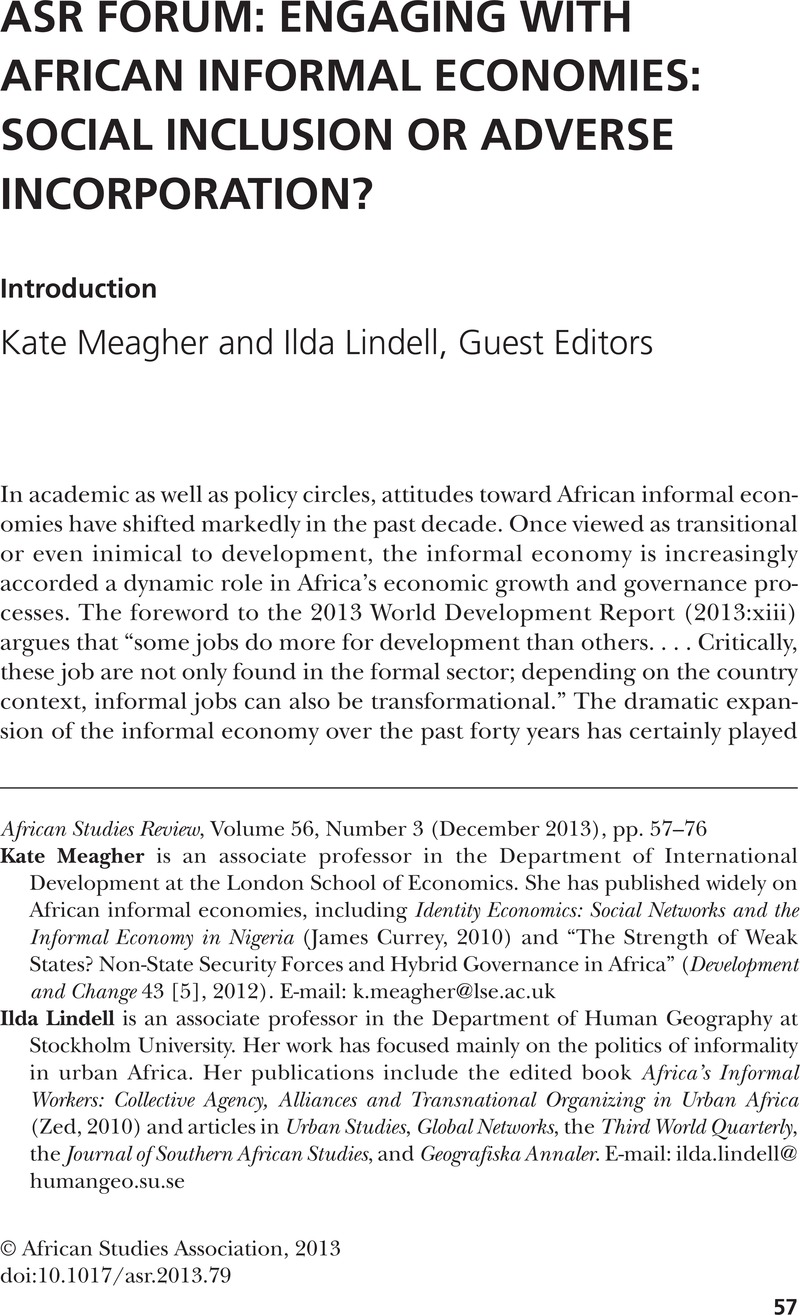Crossref Citations
This article has been cited by the following publications. This list is generated based on data provided by Crossref.
Titeca, Kristof
and
Flynn, Rachel
2014.
“Hybrid Governance,” Legitimacy, and (Il)legality in the Informal Cross-Border Trade in Panyimur, Northwest Uganda.
African Studies Review,
Vol. 57,
Issue. 1,
p.
71.
Joshi, Anuradha
Prichard, Wilson
and
Heady, Christopher
2014.
Taxing the Informal Economy: The Current State of Knowledge and Agendas for Future Research.
The Journal of Development Studies,
Vol. 50,
Issue. 10,
p.
1325.
Vos, Jelmer
2014.
Work in Times of Slavery, Colonialism, and Civil War: Labor Relations in Angola from 1800 to 2000.
History in Africa,
Vol. 41,
Issue. ,
p.
363.
2015.
Leaving No One Behind?: Informal Economies, Economic Inclusion and Islamic Extremism in Nigeria.
Journal of International Development,
Vol. 27,
Issue. 6,
p.
835.
Prichard, Wilson
and
van den Boogaard, Vanessa
2015.
Norms, Power and the Socially Embedded Realities of Market Taxation in Northern Ghana.
SSRN Electronic Journal,
Pezzano, Antonio
2016.
‘Integration’ or ‘Selective Incorporation’? The Modes of Governance in Informal Trading Policy in the Inner City of Johannesburg.
The Journal of Development Studies,
Vol. 52,
Issue. 4,
p.
498.
Meagher, Kate
Mann, Laura
and
Bolt, Maxim
2016.
Introduction: Global Economic Inclusion and African Workers.
The Journal of Development Studies,
Vol. 52,
Issue. 4,
p.
471.
Knorringa, Peter
Peša, Iva
Leliveld, André
and
van Beers, Cees
2016.
Frugal Innovation and Development: Aides or Adversaries?.
The European Journal of Development Research,
Vol. 28,
Issue. 2,
p.
143.
Waldorff, Pétur
2016.
‘The law is not for the poor’: Land, law and eviction in Luanda.
Singapore Journal of Tropical Geography,
Vol. 37,
Issue. 3,
p.
363.
Matlon, Jordanna
2016.
Racial Capitalism and the Crisis of Black Masculinity.
American Sociological Review,
Vol. 81,
Issue. 5,
p.
1014.
Mbah, Peter Oluchukwu
and
Nzeadibe, Thaddeus Chidi
2017.
Inclusive municipal solid waste management policy in Nigeria: engaging the informal economy in post-2015 development agenda.
Local Environment,
Vol. 22,
Issue. 2,
p.
203.
Prichard, Wilson
and
van den Boogaard, Vanessa
2017.
Norms, Power, and the Socially Embedded Realities of Market Taxation in Northern Ghana.
African Studies Review,
Vol. 60,
Issue. 1,
p.
171.
Racaud, Sylvain
Kago, Jackson
and
Owuor, Samuel
2017.
Introduction: Contested Street: Informal Street Vending and its Contradictions.
Articulo – revue de sciences humaines,
Jibao, Samuel S.
Prichard, Wilson
and
van den Boogaard, Vanessa
2017.
Informal Taxation in Post-Conflict Sierra Leone: Taxpayerss Experiences and Perceptions.
SSRN Electronic Journal,
Leliveld, André
and
Knorringa, Peter
2018.
Frugal Innovation and Development Research.
The European Journal of Development Research,
Vol. 30,
Issue. 1,
p.
1.
Settle, Antonia C.
2018.
The Informal Economy as a Site of Liquidity: Pakistan's Land Market.
Development and Change,
Vol. 49,
Issue. 5,
p.
1291.
van den Boogaard, Vanessa
Prichard, Wilson
and
Jibao, Samuel S.
2018.
Norms, Networks, Power, and Control: Understanding Informal Payments and Brokerage in Cross-Border Trade in Sierra Leone.
SSRN Electronic Journal,
De Herdt, Tom
and
Marivoet, Wim
2018.
Is informalization equalizing? Evidence from Kinshasa (DRC).
Journal of Contemporary African Studies,
Vol. 36,
Issue. 1,
p.
121.
Bartniczak, Bartosz
and
Raszkowski, Andrzej
2018.
Sustainable Development in African Countries: An Indicator-Based Approach and Recommendations for the Future.
Sustainability,
Vol. 11,
Issue. 1,
p.
22.
Chaturvedi, Ruchi
and
von Schnitzler, Antina
2019.
Introduction.
Comparative Studies of South Asia, Africa and the Middle East,
Vol. 39,
Issue. 1,
p.
3.





